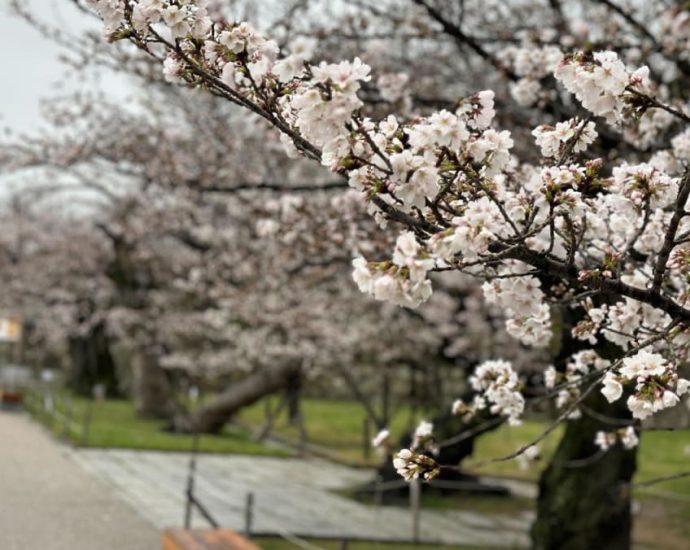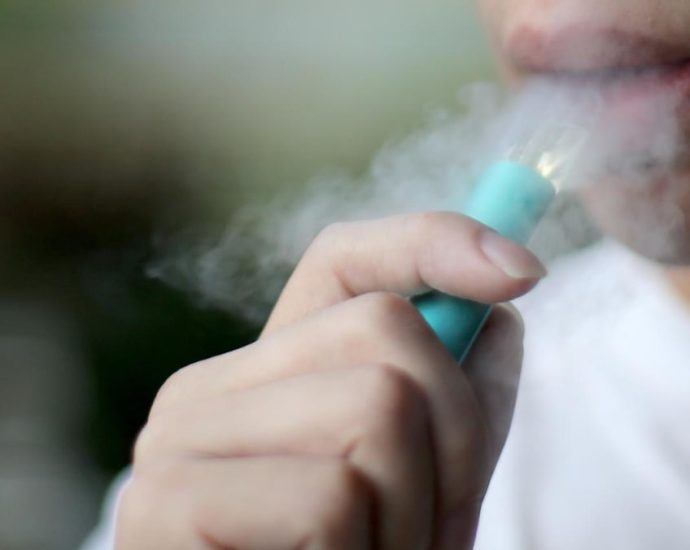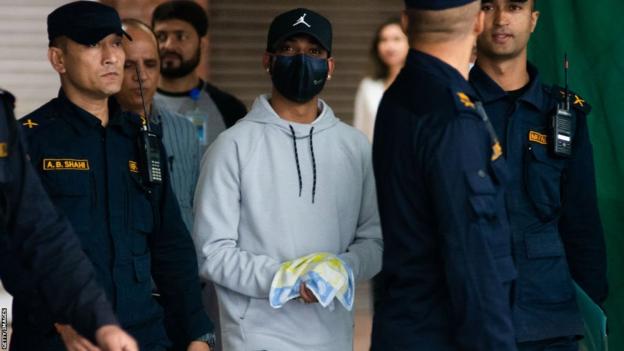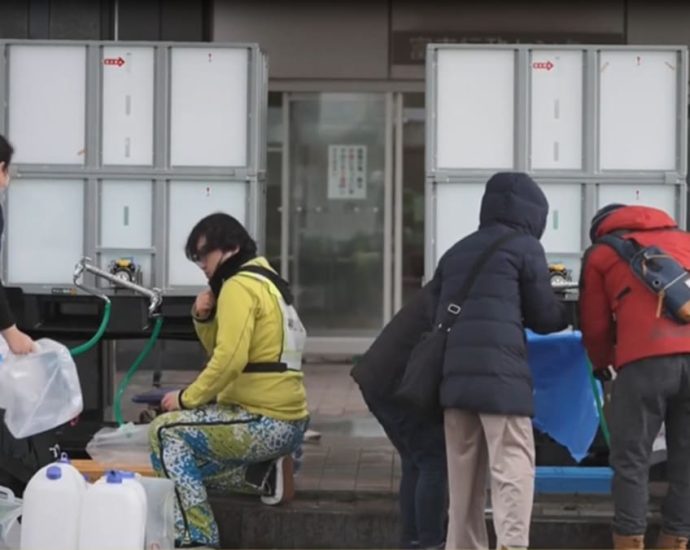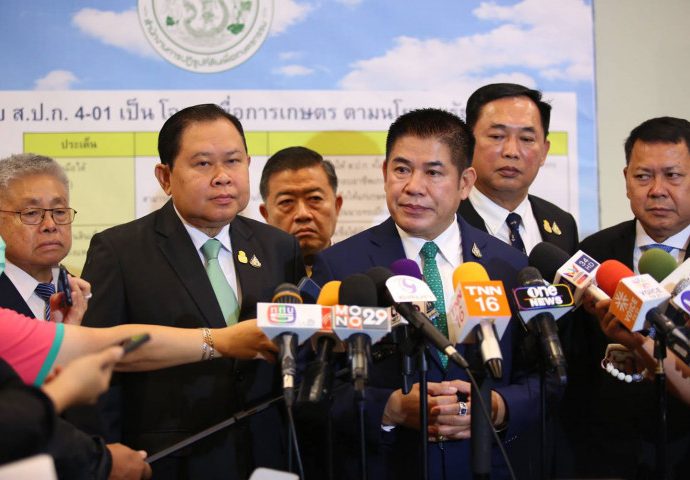Isoc 4 comes under fire for targeting Malay activists

PUBLISHED : 11 Jan 2024 at 04:00
The Committee on Legal Affairs, Justice, and Human Rights promised on Wednesday to look into a complaint regarding the Internal Security Operation Command (Isoc) Region 4’s decision to penalise activists for wearing Malay traditional dress at an event in Pattani in 2022.
Kamolsak Leewamoh, the committee chairman, said after receiving the complaint that all parties would be invited for more questioning. The complaint against Isoc Region 4’s move to issue warrants for the nine activists was submitted on Wednesday by Areepen Utarasin, adviser to the House Speaker, and Muk Sulaiman, the Speaker’s secretary. To underscore their point, both Mr Areepen and Mr Muk wore Malay national dress when submitting their complaint.
The clothing was similar to that worn by the targeted activists — and many of the other 15,000 participants — in the “Melayu Raya 2022” celebrations, a community event by and for young Malay/Muslims in Thailand’s deep South, staged in Pattani province.
Mr Areepen said the event was organised by the Civil Society Assembly for Peace (CAP) at Wasukree Beach in Sai Buri district on May 4, 2022. Wearing Malay dress was among the activities aimed at preserving local culture and providing a platform for young people to represent their identity, he said.
Mr Areepen said the organiser consulted with the Isoc Region 4 prior to the event and was told wearing such costumes was acceptable.
However, after the event, the organiser was contacted by Isoc Region 4 and Sai Buri Police Station for causing incitation and criminal association. The charges were later put on hold due to a lack of evidence.
Two years later, on Jan 5, the nine activists received warrants from Isoc Region 4 for the same two charges. Mr Areepen demanded Isoc Region 4 withdraw the charges, which he said were in violation of people’s right to wear their traditional clothing.
Isoc Region 4 responded saying the warrants were due to their participation in activities aiming at promoting separatism and displaying a flag of the Barisan Revolusi Nasional Melayu-Patani (BRN) separatist movement.
Govt won’t meddle with BoT policy: PM

Srettha aims to meet gov on weekly basis
The government respects the central bank’s independence and would never interfere with any of its decisions, according to Prime Minister Srettha Thavisin.
However, he expressed his wish to meet the governor of the Bank of Thailand (BoT) on a weekly basis in the hope of improving their work consistency.
Mr Srettha and BoT governor Sethaput Suthiwartnarueput met yesterday at Government House to discuss the central bank’s strategy for raising the policy rate.
The meeting was held after Mr Srettha voiced his opposition to the policy, saying it would cause problems for the poor, as well as for small-and medium-sized businesses.
On Sunday night, he posted on X that the central bank is planning to raise its policy rate.
Speaking after meeting Mr Sethaput, Mr Srettha said he had no authority to interfere with the central bank’s interest management policy.
He said he discussed with the governor the overall economic situation in Thailand, the global economic situation, Thailand’s negative inflation rate, the domestic market, and how people were being affected by all of this.
The PM said he also discussed with the BoT governor the issue of negative inflation, which has been occurring for several months now following the government’s interference in oil and electricity prices — moves carried out with the aim of helping to curb living costs.
“In this regard, I have told the BoT governor that we should meet up over a coffee every week. If he wants me to go to the BoT’s headquarters, it’s okay. I can do that because we need to be in constant communication,” he said.
Mr Srettha, who is also the finance minister, said he did not discuss with the BoT the government’s plans for its 10,000-baht digital money handout scheme as that matter could be discussed later at a meeting of the main parties involved in implementing it.
Pichai Naripthaphan, deputy chairman for strategies and politics of the ruling Pheu Thai Party, meanwhile, elaborated on his recent call for the BoT to come up with more financial policies to help revive the economy, which has been in a sluggish state for years.
Considering the various financial tools at its disposal, the BoT could help support the government’s efforts to revive the economy, he said.
The BoT’s authority to regulate commercial banks is one of these mechanisms, he said.
Public discontent has been rising after it was known that these banks had in the past year netted 220 billion baht in combined profit, while the country’s economic situation was not good, he said.
The BoT could help by better controlling these banks in terms of their profit margins, he said.
In 2020 when the entire country was badly affected by the Covid-19 pandemic and its economic consequences, which resulted in negative 6.1% economic growth, commercial banks here netted 146 billion baht in combined profits, said Mr Pichai.
Most if not all commercial banks in other countries at the same time recorded heavy losses, he noted.
That has raised doubts over the BoT’s efficiency in regulating commercial banks, preventing them from making too much profit and ensuring sufficient access to loans offered by these banks, he said.
Mr Pichai also outlined areas of work the BoT is encouraged to do more to help boost the country’s economic growth.
The BoT should demonstrate to the public what it can do to help accelerate the country’s slow economic growth, tackle the more than 16.5-trillion-baht household debt (90% of gross domestic product), improve the situation of bad debts facing small- and medium-sized enterprises and other problems involving debt.
On top of those things, it must also deal with negative inflation which has continued for three months and now risks become deflationary, and improve the negative value of exports and low liquidity in the country’s economic system, said Mr Pichai.
“I’d like the BoT to offer an explanation as to what it could do to help tackle these problems because it always said everything is going well and the country’s economic engine is going full steam ahead,” said Mr Pichai.
The global waste problem is now electronic â and so are its solutions
Simple op changes can pave way for more sustainable business landscape
DaaS a game-changer in acquiring, managing electronic devices sustainably
In today’s business world, technology is like the engine pushing companies into a future where everything is about digital advancements and improvements. However, this also results in a formidable challenge — the…Continue Reading
Sakura forecast for 2024: Here’s when you can catch cherry blossoms in Japan
The first flowers of 2024 will appear in Kochi on Mar 18, according to JMC, with full bloom being reached on Mar 26. On Mar 21, the blossoms will appear in Fukuoka and Nagoya, with full bloom on Mar 30 and Mar 31 respectively. Tourists will only be able toContinue Reading
Potential loss in tobacco tax revenue not a factor in e-cigarette ban: Lawrence Wong
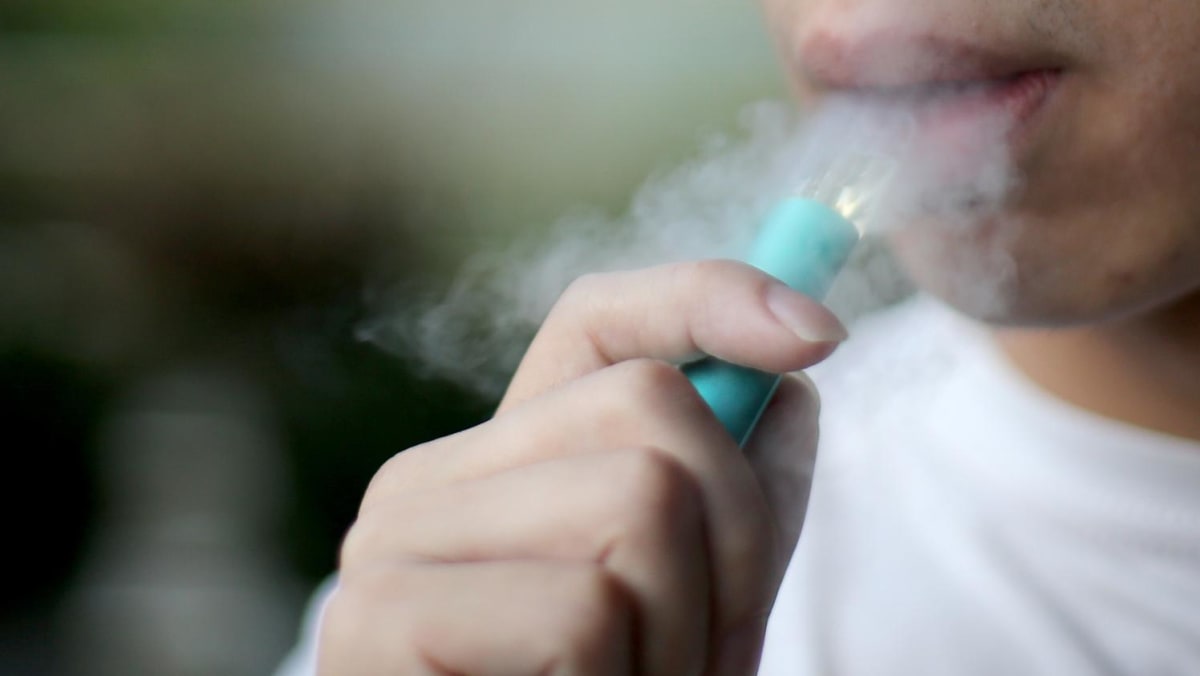
SINGAPORE: Public health, not potential tax revenue losses, was the reason Singapore decided to ban electronic cigarettes in 2018, Deputy Prime Minister Lawrence Wong said on Wednesday (Jan 10).
Member of Parliament James Lim (WP-Sengkang) had filed questions on e-cigarettes or vapes, asking if the potential loss of tax revenue was a factor in disallowing e-cigarettes.
In a written reply, Mr Wong said the ban was to protect Singapore’s population from the harms of e-cigarettes, also known as vapes.
“The potential loss in tobacco tax revenue from the reduced consumption of tobacco products was not a factor in this decision,” said Mr Wong, who is also the Finance Minister.
Assoc Prof Lim also asked about the practical limitations of introducing an equivalent nicotine tax on e-cigarette products if they were to be made legal.
Mr Wong said that if the government were to legalise and tax e-cigarettes, “the challenges would be similar to those we encounter for cigarettes and other tobacco products today”.
“In any case, the government has no plans to change our current approach, as our priority is to protect the health of our population and prevent e-cigarettes from causing harm to our people, especially younger Singaporeans,” he added.
Vaping is illegal in Singapore and offenders can be fined up to S$2,000 (US$1,490). Those who import, distribute or sell such products face stiffer penalties, including a possible jail term.
Authorities announced in December a step up in checks at air, land and sea checkpoints as part of efforts to clamp down on vaping.
During an operation at Changi Airport in late December, 177 arriving passengers were found to be in possession of e-vaporisers, 61 of whom were fined.
Aside from the border checkpoints, authorities will also increase checks at places such as the central business district, shopping centres, parks and smoking areas, as well as public entertainment outlets such as bars and clubs.
Calling these locations “public hotspots”, authorities said offenders will be issued fines on the spot.
The illicit sale of e-vaporisers via social media and messaging platforms is also being monitored, to curb online access of such items.
BlueSG waives subscription fee for January after glitches with app in December, but some users say it’s not enough
SINGAPORE: Car-sharing firm BlueSG announced on Wednesday (Jan 10) that it would be waiving its January subscription fee “for any inconvenience caused”, but subscribers said that the move is not enough. In a Facebook post, the company thanked its customers for their “unwavering support … during challenging times” and saidContinue Reading
Nepal’s Lamichhane given eight-year jail sentence
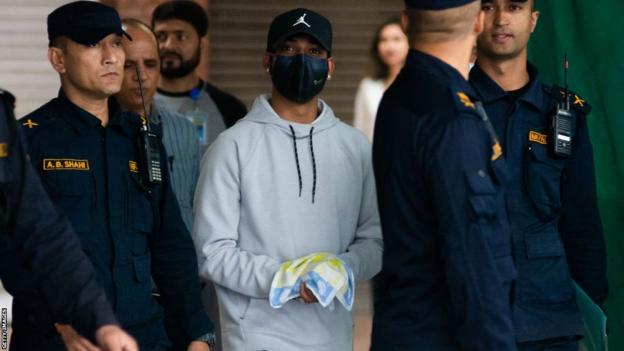
Nepal spinner Sandeep Lamichhane has been sentenced to eight years in prison for raping an 18-year-old woman.
Lamichhane, who is not in custody, was not present when the sentence was handed down at a court in the Nepalese capital Kathmandu on Wednesday.
The 23-year-old – Nepal’s most high-profile cricketer – was found guilty of the offence last month.
Lamichhane’s lawyer Saroj Ghimire told Reuters he intends to appeal against the verdict in a “higher court”.
“We are not convinced about the decision of the court,” said Ghimire. “The court has whimsically declared Sandeep to be a convict. Sandeep will go to the higher court for justice.”
Lamichhane – who has played in Australia’s Big Bash and the Indian Premier League – was suspended as Nepal captain in September 2022 due to the rape accusation.
After a warrant was issued for his arrest, he was taken into custody after flying home to Kathmandu from playing in the Caribbean Premier League (CPL).
At the time, he said on Facebook he was returning to co-operate with the investigation and denied any wrongdoing.
Following his release on bail, Lamichhane returned to the Nepal side amid protests in February 2023 for a Cricket World Cup League 2 tri-series against Scotland and Namibia.
Players from both opposition nations refused to shake his hand, but Lamichhane continued to play for Nepal throughout 2023.
Three-metre tsunami recorded at Japan nuclear plant after quake
TOKYO: Three-metre tsunami waves were recorded at, but did not damage, an offline nuclear plant in Japan following the Jan 1 earthquake, its operator said on Wednesday (Jan 10). The revelation served as a reminder of the risks associated with nuclear power in Japan 13 years after a tsunami wreckedContinue Reading
Singapore recommends safety standards for apps that carry out high-risk monetary transactions
LAWMAKERS’ CONCERNS More than 20 Members of Parliament (MPs) rose to speak during the motion, which asked that parliament reaffirm its commitment to adopt a whole-of-nation approach to sustain trust by building an inclusive and safe digital society. The motion was tabled by the Government Parliamentary Committee (GPC) for CommunicationsContinue Reading
Land rights upgrade to cover 22 million rai
Agriculture minister insists land reform for farmers will be free of loopholes that nominees could exploit
PUBLISHED : 10 Jan 2024 at 20:00

Over 22 million rai covered by Sor Por Kor 4-01 documents, widely known as land rights for the poor, will be upgraded to land title deeds for agriculture within five years, according to Agriculture Minister Thamanat Prompow.
He said the policy would provide the maximum benefits for eligible people, and insisted that there would be no loopholes for nominees to take advantage of.
Prime Minister Srettha Thavisin will kick off the programme by presenting land rights documents to 1,000 holders in Bang Sai district of Ayutthaya on Jan 15.
The ministry hopes to convert the status of 22 million rai of land under its responsibility within five years. The process could go faster if it had a bigger budget, Capt Thamanat said.
Documents for 2 million rai are now ready to be upgraded based on specific conditions, including that the land must have been in the holder’s possession for five years or more.
He said the ministry has come up with extra measures to prevent the illegal possession of land, and that wrongdoers will face criminal charges.
“We are focussing on the screening procedure to prevent the transfer of land to non-eligible people,” he said.
The minister has been a strong advocate of proper title for agricultural land, saying current regulations under the land reform law were out of date and not in line with societal changes.
If people no longer want to farm, he said, they should still have the option to benefitting from the land, including the right to sell it.
The ministry has established three regulations to support the policy, which would grant people the right to sell the land to other farmers or others conducting farming-related businesses.
Capt Thamanat said that more than 200,000 people have registered for the land title upgrade and that the Agricultural Land Reform Office branches in each province are ready to support them.
Some 22 million rai of Sor Por Kor land is now occupied by 1.6 million families.
Sor Por Kor 4-01 papers were introduced in 1975 to give poor landless farmers plots, mostly on degraded forest land, for small-scale farming. The land cannot be sold and can only be transferred to the children or heirs of the holders.
But over the years, many plots have changed hands illegally with the land used for commercial purposes including resorts. In 1995, then-agriculture minister Suthep Thaugsuban was accused of overseeing the granting of Sor Por Kor land to wealthy and connected people in Phuket. The resulting scandal brought down the Democrat Party government of Chuan Leekpai.




